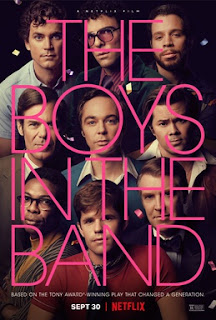I have long been drawn to Mart Crowley's The Boys in the Band, a biting examination of pre-Stonewall, pre-AIDS queer men from their own perspective. Really it's the chronicle of one gay man's breakdown surrounded by his friends no matter how self-destructive he becomes. It can be a difficult film for modern queer audiences, who prefer inspirational stories that affirm their gayness, often giving us the love stories we so often feel denied. Or at least cast us as the tragic victims of the horrible heterosexist society. But what can be so powerful about The Band is the way it so adroitly focuses on self-loathing and the stubborn refusal to connect, while, in the end offering some hope for the connection the characters (and the audience truly) is desperate for. Some find it bleak but for me I see the hope and possibilities for the kinds of affirmation we all want so badly.
With his film adaptation director Joe Mantello has pulled off something straight director William Friedkin wasn't able to do with his original film version. There is a self-awareness and honesty to this film, one which says I'm going to show it, warts and all, and I'm going to find in the wreckage the pieces of love that grow out of all that. He makes a very queer film, from the way it loves the physicalities of the men in it, to the way it explores their vulnerablilities. It shows them closeted, slutty, bitter, caring, loving, nurturing, angry, jealous, selfish, witty, racist, sexist, effeminate, hurt, bruised, and redemptive. I love the way the men in this film feel so real, so infuriating, so relatable, so honest, and not resolved or redeemed by the end of the story. They remain human.
The time is 1968. It's a different world than it is now and the characters live in a different reality than we currently do. They live under constant threat of arrest, of loss of income, of violence. Crowley, before he died, reworked the script slightly to handle a few issues better than the original draft such as examining some of the racism and sissy-shaming present in this group of mostly white queer men. Not to remove it but to examine it and call it out. The central character, Michael, played in a tour de force performance by the likable Jim Parsons, is revealed to be far less likeable than we originally think as he moves through the night, descending into his own self-loathing and trying to take everyone with him. But the beauty of this story is the way he fails to do so. There is a pre-Stonewall resiliency to these men that actually is inspiring. From the lengths Emory goes in his forgiveness, to Donald's refusal to give up despite his own emotional instability, to the way Larry and Hank build a real relationship outside of the norms put upon them. I am drawn to this refusal to give in to the darkness. Instead, The Boys in the Band is about learning how to love.
Probably my personal favourite part of this story is the relationship between Larry and Hank, who appear to be stereotypically on the brink of breaking up but the film shows us they have something truly special together. Like the way it shows us how much the friendships between these men, dysfunctional because of the general abuse they suffer in the world, remain as valid and probably life saving, as any. Even the frenemy battle of wits between Harold and Michael is seen as something truly connecting for the two men who, under the resentment and bitterness truly care about each other. There is a real sense in the end Harold will check on Michael tomorrow. I love how Mantello gets all this and makes it real.
I also loved how beautiful the film was. From the gorgeous costumes which evoked every fantasy I have about 60s fashion to Michael's dream apartment, the film is awash in lovely colours and beautiful pieces of art direction. Mantello's visual style stands out, especially in a story that mostly happens in one room. He also, through his use of flashbacks to the moments of inspiring love these men each experienced, creates these gorgeous visual memories like looking into Harry Potter's queer pensieve. Mantello hasn't just put the play on a set and filmed a play, he has created a truly cinematic visual language which captures the amazing beauty of gay love and sex and connection.
While I thought the entire cast was wonderful, another standout is Robin de Jesus as Emory, a character I've seen played mostly for laughs, who here owns every scene he is in. He gives Emory a real gravitas and power, without ever diminishing his sassy, sissy style.
The Boys in the Band is hard cause it looks unflinchingly at the way gay men hurt themselves and each other, but it does so much more than that, especially in this film which, with its all gay cast and queer director/writers, finds the ways queer men take care of each other, imperfectly and fabulously and yes, queerly.

No comments:
Post a Comment